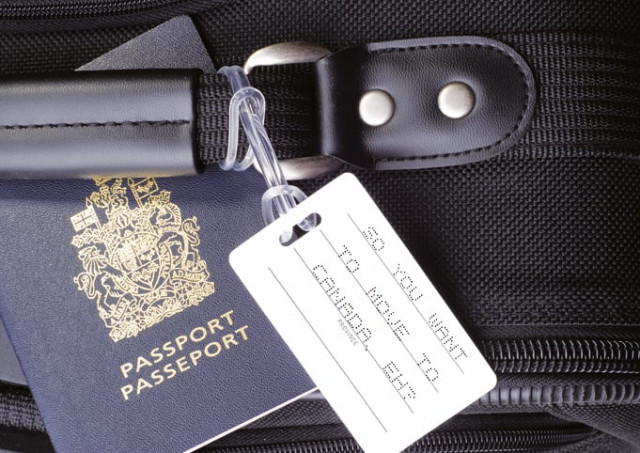So you want to move to Canada, eh?
From the hazy vantage point of the Indus, scarcely populated Canada is the land of dreams and opportunities.

Scarcely populated Canada is the land of dreams and opportunities. PHOTO: EXPRESS/FILE
“I didn’t know anyone in Toronto and I had no social or professional base here.” There were hurdles on the way as she set out on a rigorous job search, sending out two dozen job applications per day and making cold calls at various offices to drop off her resume. As someone who had served as an Assistant Vice President (AVP) in corporate banking back home, she would constantly find herself being offered entry-level positions in Canada. “I was told that I will have to complete some Canadian accreditation course or else start from a bank teller position.” Eventually her hard work paid off and after being interviewed by a senior manager at the Royal Bank of Canada, she was offered a role in business development at the bank. “Now when I look back and hear other peoples’ stories, I feel very fortunate.”
Hina’s story is typical of many Pakistani immigrants to Canada, who have to either struggle to find the right job, or failing that, settle for less. 40-year-old Anwer Dar*, who is a marketer by profession, is back in Pakistan after spending six months in Canada, where he has also left his family. “I am not willing to settle for less than what I am qualified to do,” he says. “In fact, I applied for a particular category and now I can’t find the job for which I was approved. This country has a shortage of skilled labour, but this system is not tuned with the reality.”
Ikram Qureshi, a teacher at the Peel District School in Canada, agrees that settling down in Canada after immigration is not easy. “All that glitters is not gold,” he says. “While settling down in Canada, professional expertise and educational compatibility were the main concerns. But when I landed in Canada, it was a totally different story.” Qureshi feels that he was wronged by the many ‘pseudo’ immigration consultants in Pakistan who didn’t give him a clear picture of Canadian requirements. “I think there are some major discrepancies in the immigration procedure. None of my qualifications were acknowledged. The category I qualified for was supported by my documents, my professional experience and degrees,” he says. “I was told in most of the interviews that I didn’t have Canadian experience, even if a few of the employers considered my qualifications to be acceptable.” Eventually, after many fruitless job searches he figured out how the system works. “The solution lies in certification,” he concludes. “Get yourself certified from relevant institutions and then seek the required experience. Though it’s tough and time consuming there is no other way around the requirements.”
According to Sikander Lalani, an immigration consultant and the CEO of Karachi-based Lalani and Associates, “Opportunities are open for those who can fit into the developed world and can deliver what is new and unique and fruitful. After immigration, the biggest issue is of settlement, and this is possible only if one gets into their education system and tunes oneself according to the local standard skills.”
Disclosing the changing requirements for 2013 immigration to Canada, Lalani says that “laws are getting tougher and tougher.” Although 55,000 visas for skilled workers will be offered by the Canadian government this year, Lalani feels that there are some changes that will affect Pakistani applicants. Immigration applications are judged on a points system, and the weightage of language requirements (fluency in French or English) has now increased from 16 to 24 points. There is thus a greater demand for young people who are fluent in these two languages and are also well educated. Direct applications for Canadian immigration are also likely to reduce in the future and Lalani says that immigration processes will now look exclusively for experience in the country or some form of Canadian credentials. This may be obtainable through temporary work permits or by enrolling at post-secondary educational institutions.
Some of these problems are resolved by getting an approval from the autonomous accreditation bodies that are set up for each profession. These bodies endorse permissions to work in the country, and provide for a license to work in that particular field. Often, these licenses are difficult to obtain for immigrants. On the other hand, demand is gradually shifting to the provincial nominee programme, where Canadian provinces invite migrants on the basis of a working permit, keeping in mind the specific skill sets that province requires. Once the migrant finds a job, this permit can become a residency. The benefit here is that provinces are better able to judge which labour is in demand within their localities, and the chance of these migrants finding a suitable job is higher.
But getting there is only one part of the struggle. Being accepted into the larger community is quite another. Making matters worse are the increasing number of Pakistani applicants illegally entering Canada, or else using false information to burnish their credentials. This adds to the aura of suspicion around the Pakistani community, and often delays immigration procedures. “Illegal immigrants are the biggest threat,” Lalani says.
Unlike the mass exodus of Pakistani labourers to Britain in the aftermath of the Second World War, Canadian immigration rejects members of the working classes in favour of highly qualified professionals and academics. But notwithstanding this selection criterion, there are many who continue to persevere in their search for a new life in Canada, despite not being able to fulfill the criteria. Often using the services of non-licensed consultants in Pakistan, non eligible applicants create fraudulent documents in the hope of crossing the finish line. While some of them manage to make it, the majority end up losing both their money and the opportunity.
One such case is 33-year-old Farah*, who still believes she can find a niche for herself in the Canada. Despite being unable to find a job in Pakistan, she is driven by the attraction of a foreign land. When asked how she expects to achieve what she has not been able to do in her home country, she lists a number of possible occupations that she and her husband can take up: driving a taxi, opening a restaurant or being an attendant at a daycare centre. Farah describes her efforts to immigrate to Canada. “I did a beautician course and applied for that category in Canada. I had no experience and instead used a fake employment certificate. We suffered when the investigation began and my supposed employer failed to answer the investigators’ questions. It’s been almost 12 years my husband has been trying frantically for immigration. We have spent almost 20 lakh rupees but all in vain”
“It is usually believed that once the medical checkup has been completed it means that the case has been accepted and that visas will soon follow,” says Ameen* who had applied for immigration by using a fake certificate in which he claimed he was a chef. “I managed to get my medical cleared, but then the investigations began and that resulted in the failure of the process,” admits Ameen.* “I guess it was our consultant’s trick to get money out of us,” he adds as an afterthought.
In this scramble to emigrate, many such applicants not only end up inflicting monetary losses upon themselves, but also raise the bar for eligible applicants. “These people should realise that they are creating hurdles for the next generation of immigrants. Once they are rejected due to their fraudulent documents and misrepresentations, this will affect their childrens’ applications to any part of the western world as these countries do share data,” says Lalani.

It is not uncommon for Pakistani immigrants to feel that they are being wrongly associated with either the political context back home or the actions of their larger community. According to Lalani, the political upheavals in Pakistan, which are closely monitored by Canadian authorities, can directly impact the immigration procedures of Pakistani applicants. “The wave of terrorism, in addition to the bad press Pakistan gets, has added to the difficulties faced by Pakistani applicants,” he says.
“Around the time I immigrated,” says Hina Jawad, “Pakistan was in the media spotlight for all the wrong reasons. Soon after I started my job at a Canadian bank, Benazir Bhutto was assassinated. There was a lot of political unrest in Pakistan, and I felt like I was scrutinised at all times.” But gradually Hina was able to make inroads into the Canadian community and gain acceptance as a qualified professional with good work ethics. “To many, it was also a shock that a Pakistani Muslim can actually speak fluent English, that she can be educated and well-informed,” she adds.
But Hina considers herself fortunate, acknowledging that her success story may not be representative of all migrants. “Through my positive approach and work ethics, I think I managed to change their views. With time I progressed, got accolades and acknowledgement internally and externally in the banking network and was soon promoted to senior manager. In this role again I have made a place for myself within the bank and in the South Asian community and can feel the respect and acceptance from them as a professional. My story is a bit different from many others because today when I look back, I believe God has been very gracious to me, and I have adopted the right approach with persistent efforts.”
Canadian permanent residents of Pakistani origin have declined from 15,353 in 2001, to 4,986 in 2010, a drop of 67%
Canadian Immigration Programmes
Skilled workers and professionals
For people who want to settle and work in Canada (outside of Quebec)
Skilled trades
For people who want to immigrate based on being qualified in a skilled trade.
Quebec-selected skilled workers
For people selected by the Quebec government to settle and work in Quebec
Canadian Experience Class
For people who have recent Canadian work experience or have graduated and recently worked in Canada
Investors, entrepreneurs and self-employed people
For people who want to start a business in Canada
Provincial nominees
One of Canada’s provinces or territories can nominate you to settle and work there
Sponsoring your family
If you are a permanent resident or a Canadian citizen, you can sponsor a family member to join you there
Live-in caregivers
For individuals who are qualified to provide care for children, elderly persons or persons with disabilities in private homes without supervision
Refugees
For people in or outside Canada who fear returning to/ living in their home country
Published in The Express Tribune, Sunday Magazine, March 31st, 2013.
Like Express Tribune Magazine on Facebook to stay informed and join the conversation.



















COMMENTS
Comments are moderated and generally will be posted if they are on-topic and not abusive.
For more information, please see our Comments FAQ